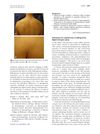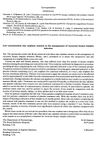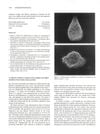 15 citations,
October 2006 in “Journal of the American Academy of Dermatology”
15 citations,
October 2006 in “Journal of the American Academy of Dermatology” Liquid nitrogen spray caused a temporary, harmless swelling under the skin in an elderly woman.
 3 citations,
January 1985 in “British Journal of Dermatology”
3 citations,
January 1985 in “British Journal of Dermatology” Zinc sulphate solution was not effective in reducing the number, duration, or severity of recurrent herpes simplex infections.
 1 citations,
April 2018 in “Journal of Investigative Dermatology”
1 citations,
April 2018 in “Journal of Investigative Dermatology” Fzd2 is important for skin and hair development through various signaling ways.
 April 2018 in “Journal of Investigative Dermatology”
April 2018 in “Journal of Investigative Dermatology” Older hair follicle stem cells have a reduced ability to renew themselves, leading to more hair loss.
 April 2018 in “Journal of Investigative Dermatology”
April 2018 in “Journal of Investigative Dermatology” Both Th1 and Th2 immune responses are increased in alopecia areata, with Th2 response more strongly linked to how severe the disease is.
 April 2018 in “Journal of Investigative Dermatology”
April 2018 in “Journal of Investigative Dermatology” Activating Nrf2 helps wounds heal faster by increasing hair follicle stem cells.
 April 2018 in “Journal of Investigative Dermatology”
April 2018 in “Journal of Investigative Dermatology” Topical tofacitinib is effective in promoting hair growth for non-scarring alopecia.
 175 citations,
April 1982 in “Journal of The American Academy of Dermatology”
175 citations,
April 1982 in “Journal of The American Academy of Dermatology” Isotretinoin is highly effective in treating severe acne, rosacea, and gram-negative folliculitis.
 8 citations,
February 2010 in “Journal of Dermatology”
8 citations,
February 2010 in “Journal of Dermatology” A topical treatment safely and effectively reduced acne by causing targeted cell death in sebaceous glands without side effects.
 8 citations,
September 1993 in “British journal of dermatology/British journal of dermatology, Supplement”
8 citations,
September 1993 in “British journal of dermatology/British journal of dermatology, Supplement” A new method helps isolate key hair components to study hair growth and loss.
 7 citations,
January 2016 in “Laboratory Investigation”
7 citations,
January 2016 in “Laboratory Investigation” TR3 is mainly found in hair follicle stem cells and may be involved in hair loss.
 7 citations,
March 2005 in “British Journal of Dermatology”
7 citations,
March 2005 in “British Journal of Dermatology” Indian men have 62.1% hair loss, mostly grade II vertex, and less extensive than other populations.
 6 citations,
June 2018 in “Journal of pediatric endocrinology & metabolism/Journal of pediatric endocrinology and metabolism”
6 citations,
June 2018 in “Journal of pediatric endocrinology & metabolism/Journal of pediatric endocrinology and metabolism” Patients with the same genetic mutation for vitamin D-resistant rickets showed different symptoms but all improved with treatment except for hair loss.
 6 citations,
November 2017 in “Scientific reports”
6 citations,
November 2017 in “Scientific reports” The R343H mutation in the VDR gene causes vitamin D-resistant rickets with alopecia by impairing specific gene activity.
 5 citations,
July 2019 in “Journal of Cutaneous Medicine and Surgery”
5 citations,
July 2019 in “Journal of Cutaneous Medicine and Surgery” Isotretinoin may cause hair loss, especially in women and young adults.
 1 citations,
March 2011 in “Informa Healthcare eBooks”
1 citations,
March 2011 in “Informa Healthcare eBooks” Isotretinoin is a preferred treatment for severe acne, often leading to long-term improvement, but requires careful monitoring due to potential side effects.
 December 2015 in “Dermatologic Therapy”
December 2015 in “Dermatologic Therapy” Zinc sulfate solution is more effective than tea lotion for treating acne rosacea.
 August 2001 in “Journal of Cutaneous Medicine and Surgery”
August 2001 in “Journal of Cutaneous Medicine and Surgery” Prednisone has risks for lupus patients, isotretinoin is safe for mental health, transplant patients risk skin cancer, and various treatments are effective for specific skin conditions.
 September 1997 in “Journal of The European Academy of Dermatology and Venereology”
September 1997 in “Journal of The European Academy of Dermatology and Venereology” New treatment improves male hair loss.
 104 citations,
May 2003 in “Endocrinology”
104 citations,
May 2003 in “Endocrinology” Lampreys have a functional vitamin D receptor that may help detoxify harmful substances.
 60 citations,
May 2015 in “Archives of dermatological research”
60 citations,
May 2015 in “Archives of dermatological research” PPAR agonists show promise for skin conditions but need more research before being a main treatment.
 45 citations,
February 2011 in “Journal of the European Academy of Dermatology and Venereology”
45 citations,
February 2011 in “Journal of the European Academy of Dermatology and Venereology” People with lichen planus have higher bad cholesterol and lower good cholesterol, increasing their risk for heart disease.
 45 citations,
August 2005 in “Bioorganic & medicinal chemistry”
45 citations,
August 2005 in “Bioorganic & medicinal chemistry” New compounds with carborane showed anti-androgen effects similar to flutamide.
 45 citations,
June 2004 in “Lasers in Medical Science”
45 citations,
June 2004 in “Lasers in Medical Science” Intense pulsed light (IPL) is an efficient and safe method for hair removal, reducing hair by about 80%.
 37 citations,
April 2011 in “Journal of Biological Chemistry”
37 citations,
April 2011 in “Journal of Biological Chemistry” LEF1 interacts with Vitamin D Receptor, affecting hair follicle regeneration and this could be linked to hair loss conditions.
 32 citations,
January 2007 in “Biological & Pharmaceutical Bulletin”
32 citations,
January 2007 in “Biological & Pharmaceutical Bulletin” Minoxidil and retinol together help hair grow.
 30 citations,
December 2001 in “Journal of The European Academy of Dermatology and Venereology”
30 citations,
December 2001 in “Journal of The European Academy of Dermatology and Venereology” Hormonal therapy is a good option for women with severe acne, especially when there's a chance of hormone imbalance.
 25 citations,
August 2014 in “Endocrinology”
25 citations,
August 2014 in “Endocrinology” Researchers created a mouse model of a type of rickets that does not cause hair loss.
 22 citations,
October 2020 in “Anais Brasileiros de Dermatologia”
22 citations,
October 2020 in “Anais Brasileiros de Dermatologia” The Brazilian Society of Dermatology agrees that oral isotretinoin is effective for acne and other skin conditions, and it's safe when monitored, but more research is needed on dosing and duration.
 19 citations,
November 2012 in “Journal of Dermatological Treatment”
19 citations,
November 2012 in “Journal of Dermatological Treatment” Isotretinoin improves severe acne without changing androgen or insulin levels but may increase body weight and triglycerides.






























